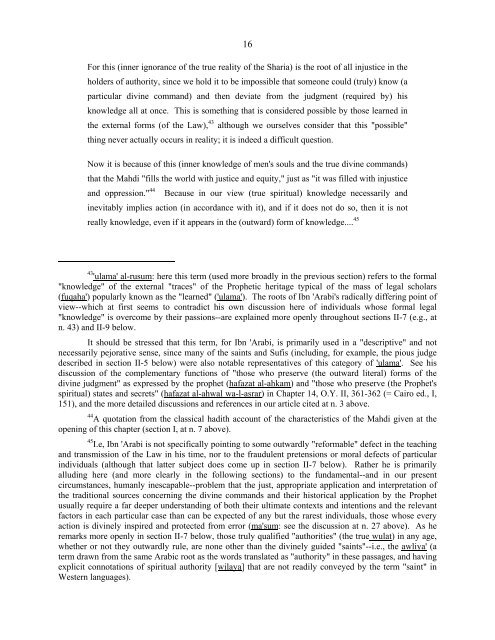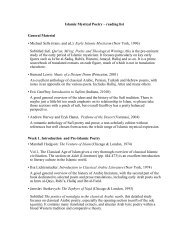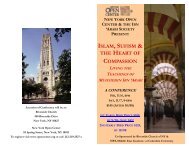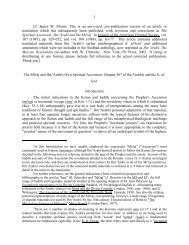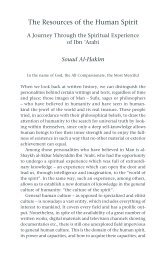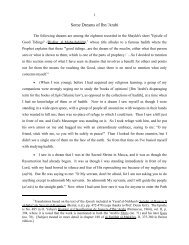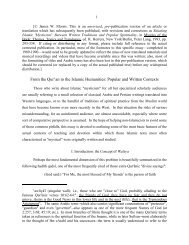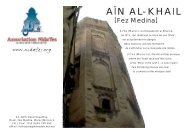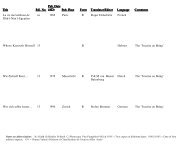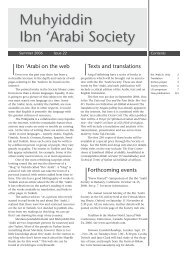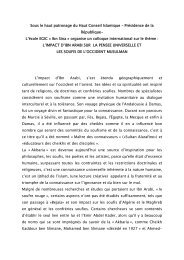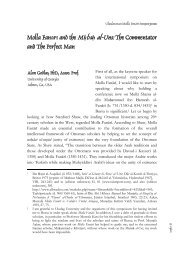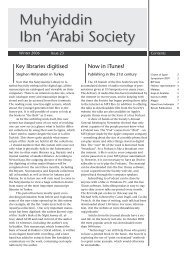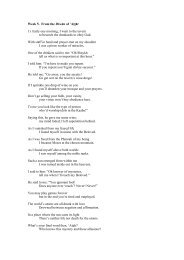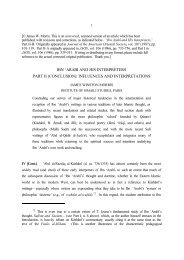The Mahdi and His Helpers - Muhyiddin Ibn Arabi Society
The Mahdi and His Helpers - Muhyiddin Ibn Arabi Society
The Mahdi and His Helpers - Muhyiddin Ibn Arabi Society
You also want an ePaper? Increase the reach of your titles
YUMPU automatically turns print PDFs into web optimized ePapers that Google loves.
16For this (inner ignorance of the true reality of the Sharia) is the root of all injustice in theholders of authority, since we hold it to be impossible that someone could (truly) know (aparticular divine comm<strong>and</strong>) <strong>and</strong> then deviate from the judgment (required by) hisknowledge all at once. This is something that is considered possible by those learned inthe external forms (of the Law), 43 although we ourselves consider that this "possible"thing never actually occurs in reality; it is indeed a difficult question.Now it is because of this (inner knowledge of men's souls <strong>and</strong> the true divine comm<strong>and</strong>s)that the <strong>Mahdi</strong> "fills the world with justice <strong>and</strong> equity," just as "it was filled with injustice<strong>and</strong> oppression." 44 Because in our view (true spiritual) knowledge necessarily <strong>and</strong>inevitably implies action (in accordance with it), <strong>and</strong> if it does not do so, then it is notreally knowledge, even if it appears in the (outward) form of knowledge.... 4543 'ulama' al-rusum: here this term (used more broadly in the previous section) refers to the formal"knowledge" of the external "traces" of the Prophetic heritage typical of the mass of legal scholars(fuqaha') popularly known as the "learned" ('ulama'). <strong>The</strong> roots of <strong>Ibn</strong> '<strong>Arabi</strong>'s radically differing point ofview--which at first seems to contradict his own discussion here of individuals whose formal legal"knowledge" is overcome by their passions--are explained more openly throughout sections II-7 (e.g., atn. 43) <strong>and</strong> II-9 below.It should be stressed that this term, for <strong>Ibn</strong> '<strong>Arabi</strong>, is primarily used in a "descriptive" <strong>and</strong> notnecessarily pejorative sense, since many of the saints <strong>and</strong> Sufis (including, for example, the pious judgedescribed in section II-5 below) were also notable representatives of this category of 'ulama'. See hisdiscussion of the complementary functions of "those who preserve (the outward literal) forms of thedivine judgment" as expressed by the prophet (hafazat al-ahkam) <strong>and</strong> "those who preserve (the Prophet'sspiritual) states <strong>and</strong> secrets" (hafazat al-ahwal wa-l-asrar) in Chapter 14, O.Y. II, 361-362 (= Cairo ed., I,151), <strong>and</strong> the more detailed discussions <strong>and</strong> references in our article cited at n. 3 above.44 A quotation from the classical hadith account of the characteristics of the <strong>Mahdi</strong> given at theopening of this chapter (section I, at n. 7 above).45 I.e, <strong>Ibn</strong> '<strong>Arabi</strong> is not specifically pointing to some outwardly "reformable" defect in the teaching<strong>and</strong> transmission of the Law in his time, nor to the fraudulent pretensions or moral defects of particularindividuals (although that latter subject does come up in section II-7 below). Rather he is primarilyalluding here (<strong>and</strong> more clearly in the following sections) to the fundamental--<strong>and</strong> in our presentcircumstances, humanly inescapable--problem that the just, appropriate application <strong>and</strong> interpretation ofthe traditional sources concerning the divine comm<strong>and</strong>s <strong>and</strong> their historical application by the Prophetusually require a far deeper underst<strong>and</strong>ing of both their ultimate contexts <strong>and</strong> intentions <strong>and</strong> the relevantfactors in each particular case than can be expected of any but the rarest individuals, those whose everyaction is divinely inspired <strong>and</strong> protected from error (ma'sum: see the discussion at n. 27 above). As heremarks more openly in section II-7 below, those truly qualified "authorities" (the true wulat) in any age,whether or not they outwardly rule, are none other than the divinely guided "saints"--i.e., the awliya' (aterm drawn from the same <strong>Arabi</strong>c root as the words translated as "authority" in these passages, <strong>and</strong> havingexplicit connotations of spiritual authority [wilaya] that are not readily conveyed by the term "saint" inWestern languages).


